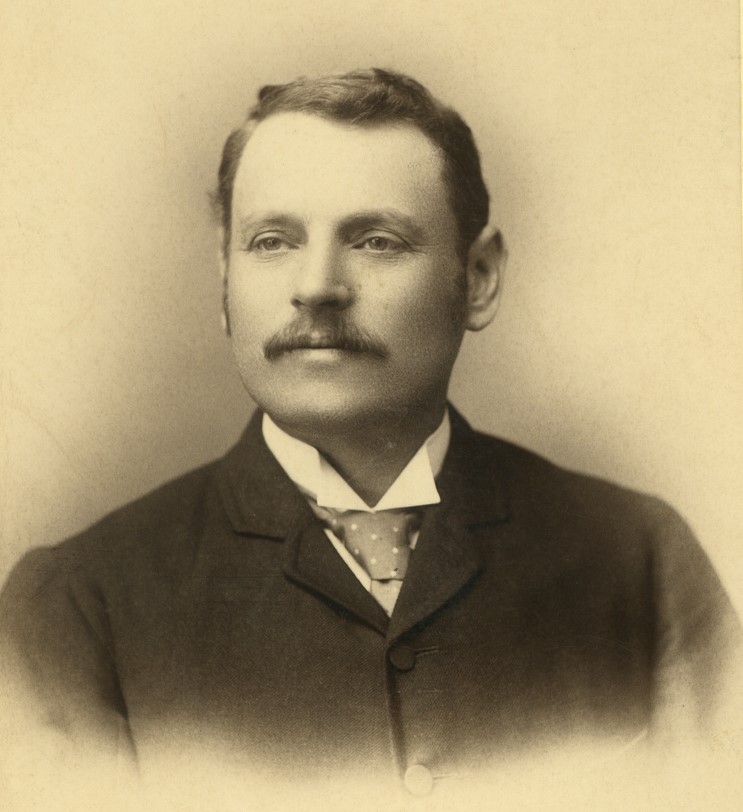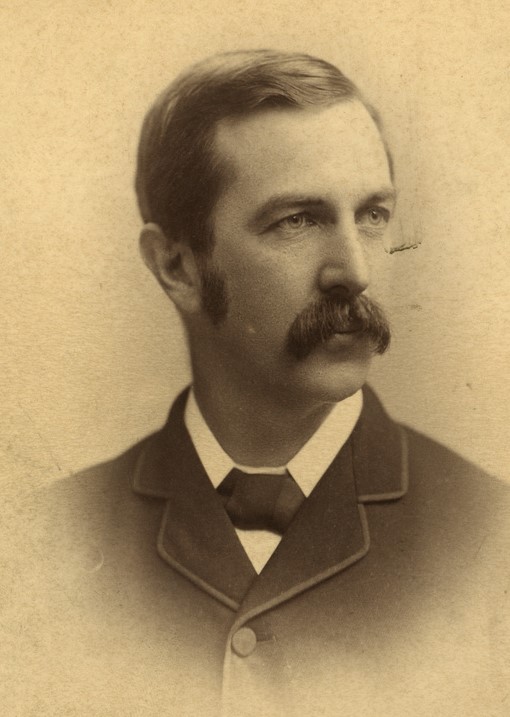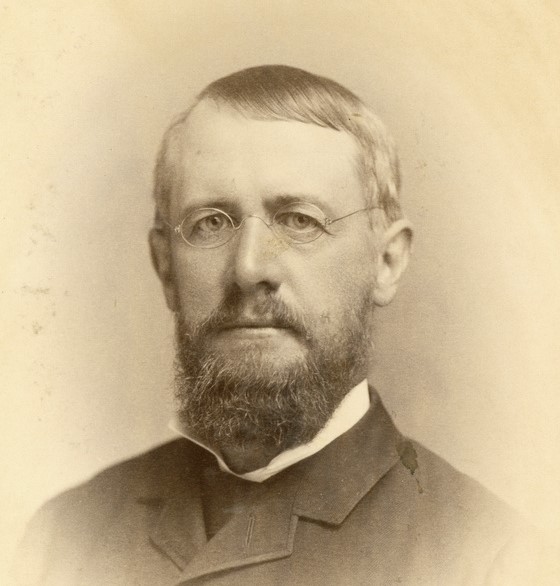|
Allan Campbell (Australian Politician)
Allan Campbell (30 April 1836 – 30 October 1898) was a South Australian politician, medical practitioner and philanthropist. History Campbell was born in the Barony Parish of Glasgow in 1836, and grew up in Cathcart, a village in Renfrewshire. He was educated in the parish school, and studied mathematics and physical sciences in Glasgow. Some years later he studied medicine, and in 1867 was admitted to the Royal College of Physicians, Edinburgh, and the Faculty of Physicians and Surgeons, Glasgow. His health was never robust, which may have induced him to emigrate into South Australia, where he entered into partnership with Dr. H. Wheeler in Adelaide sometime before February 1867. They were involved in the establishment of a homoeopathic dispensary in King William Street that offered its services free to the poor. He proved to be a very public-spirited citizen, and joined the committee of the Society of Arts, and took a seat on the Board of Education, and was for a time its ch ... [...More Info...] [...Related Items...] OR: [Wikipedia] [Google] [Baidu] |
Renfrewshire
Renfrewshire () ( sco, Renfrewshire; gd, Siorrachd Rinn Friù) is one of the 32 council areas of Scotland. Located in the west central Lowlands, it is one of three council areas contained within the boundaries of the historic county of Renfrewshire, the others being East Renfrewshire to the east and Inverclyde to the west. It also shares borders with Glasgow, North Ayrshire and West Dunbartonshire, and lies on the southern bank of the River Clyde. The term Renfrewshire may also be used to refer to the historic county, also known as the County of Renfrew or Greater Renfrewshire, with origins in the 16th century. The larger Renfrewshire, containing Renfrewshire, Inverclyde and East Renfrewshire, remains in use as a registration county and lieutenancy area as well as a joint valuation board area for electoral registration and local tax valuation purposes. The town of Paisley is the area's main settlement and centre of local government and contains the historic county town, ... [...More Info...] [...Related Items...] OR: [Wikipedia] [Google] [Baidu] |
South Australian Literary Societies' Union
South Australian Literary Societies' Union (1883–1926) was a peak or advocacy organisation of literary societies in South Australia. It organised competitions between the member societies and established a "Union Parliament" to debate issues of the day. In 1932 a similar organisation named Literary Societies' Union of South Australia was founded. History A popular form of social and intellectual entertainment for young gentlemen in late nineteenth and early twentieth century Adelaide was the literary society, which at its peak numbered around fifty, some, perhaps most, attached to churches. Facilities and entertainments enjoyed by members apart from companionship of like-minded individuals, and perhaps a little networking, may have included: *Maintenance of a library. At a time when the cost of a book could equal a workman's weekly wages, a valuable resource. *Appearance of guest speakers *Readings by members of original or favourite poetry or prose pieces *Impromptu speeches ... [...More Info...] [...Related Items...] OR: [Wikipedia] [Google] [Baidu] |
Australian Homeopaths
Australian(s) may refer to: Australia * Australia, a country * Australians, citizens of the Commonwealth of Australia ** European Australians ** Anglo-Celtic Australians, Australians descended principally from British colonists ** Aboriginal Australians, indigenous peoples of Australia as identified and defined within Australian law * Australia (continent) ** Indigenous Australians * Australian English, the dialect of the English language spoken in Australia * Australian Aboriginal languages * ''The Australian'', a newspaper * Australiana, things of Australian origins Other uses * Australian (horse), a racehorse * Australian, British Columbia, an unincorporated community in Canada See also * The Australian (other) * Australia (other) * * * Austrian (other) Austrian may refer to: * Austrians, someone from Austria or of Austrian descent ** Someone who is considered an Austrian citizen, see Austrian nationality law * Austrian German dialect * Someth ... [...More Info...] [...Related Items...] OR: [Wikipedia] [Google] [Baidu] |
Members Of The South Australian Legislative Council
Member may refer to: * Military jury, referred to as "Members" in military jargon * Element (mathematics), an object that belongs to a mathematical set * In object-oriented programming, a member of a class ** Field (computer science), entries in a database ** Member variable, a variable that is associated with a specific object * Limb (anatomy), an appendage of the human or animal body ** Euphemism for penis * Structural component of a truss, connected by nodes * User (computing), a person making use of a computing service, especially on the Internet * Member (geology), a component of a geological formation * Member of parliament * The Members, a British punk rock band * Meronymy, a semantic relationship in linguistics * Church membership, belonging to a local Christian congregation, a Christian denomination and the universal Church * Member, a participant in a club or learned society A learned society (; also learned academy, scholarly society, or academic association) is an ... [...More Info...] [...Related Items...] OR: [Wikipedia] [Google] [Baidu] |
Scottish Emigrants To Colonial Australia
Scottish usually refers to something of, from, or related to Scotland, including: *Scottish Gaelic, a Celtic Goidelic language of the Indo-European language family native to Scotland *Scottish English *Scottish national identity, the Scottish identity and common culture *Scottish people, a nation and ethnic group native to Scotland *Scots language, a West Germanic language spoken in lowland Scotland *Symphony No. 3 (Mendelssohn), a symphony by Felix Mendelssohn known as ''the Scottish'' See also *Scotch (other) *Scotland (other) *Scots (other) *Scottian (other) *Schottische The schottische is a partnered country dance that apparently originated in Bohemia. It was popular in Victorian era ballrooms as a part of the Bohemian folk-dance craze and left its traces in folk music of countries such as Argentina ("chotis"Span ... * {{disambiguation Language and nationality disambiguation pages ca:Escocès ... [...More Info...] [...Related Items...] OR: [Wikipedia] [Google] [Baidu] |
John Hannah Gordon
Sir John Hannah Gordon KC (26 July 1850 – 23 December 1923) was a Scottish-Australian politician and judge. He was a member of the South Australian Legislative Council from 1888 to 1892 and from 1893 to 1903. He was a minister under four Premiers: John Cockburn, Frederick Holder, Charles Kingston and John Jenkins, variously as Minister for Education, Chief Secretary, Attorney-General, and Minister Controlling the Northern Territory. He was a judge of the Supreme Court of South Australia from 1903. Early life Gordon was born at Kilmacolm, Renfrewshire, Scotland, the eldest son of the Rev. James Gordon, preacher of the Free Church, and his wife Margaret, ''née'' Leonard. The family emigrated to South Australia in 1859 where Rev. Gordon took charge of the Presbyterian church at Mount Barker, and was afterwards stationed at Gawler. Gordon's younger brother, William Beattie Gordon, who was born in Gawler, became a member of parliament in Western Australia. Gordon was educated ... [...More Info...] [...Related Items...] OR: [Wikipedia] [Google] [Baidu] |
Edward Willis Way
Dr. Edward Willis Way (1847 – 28 September 1901), frequently written as "E. Willis Way", was a noted medical doctor and surgeon in the early days of the colony of South Australia. Early life and education Way was a son of Rev. James Way of the Bible Christian Church, and brother of Sir Samuel Way, the noted jurist, and left for Adelaide with his parents as a young child in the ''Anna Maria'', arriving on 14 November 1850. He was educated at AEI and St. Peter's College before studying medicine at Guy's Hospital and the University of Edinburgh. Career He returned to Adelaide and soon had a lucrative practice, though pursuit of wealth was not his prime concern. He was Medical Officer to the Stockade (later Yatala Labour Prison) and Health Officer to the Adelaide City Council. He established his own private hospital (previously Miss Baker's Private Hospital?) in North Adelaide. He lectured in obstetrics and gynaecology at the University of Adelaide. Much of his work at the No ... [...More Info...] [...Related Items...] OR: [Wikipedia] [Google] [Baidu] |
Sir Samuel Way
Sir Samuel James Way, 1st Baronet, (11 April 1836 – 8 January 1916) was an English-Australian jurist who served as Chief Justice of the Supreme Court of South Australia from 18 March 1876 until 8 January 1916. Background Way was born in Portsmouth, England. Reverend James Way, his father, was a clergyman in the Bible Christian Church, who emigrated to Adelaide, South Australia in 1850 along with his wife and four younger children to establish a mission. Samuel, the eldest child, remained behind, studying at Shebbear College in Shebbear, a small village in North Devon, and later at a school in Chatham in Kent. He left England to rejoin his family at the end of 1852, arriving in Adelaide in March 1853. He was soon employed in the office of John Tuthill Bagot, at that time a barrister, and in 1856 became an articled clerk to Alfred Atkinson (c. 1825 – 4 June 1861), solicitor of King William Street. Legal and judicial career On 25 March 1861, Way was admitted to the South ... [...More Info...] [...Related Items...] OR: [Wikipedia] [Google] [Baidu] |
Northern District (South Australian Legislative Council)
Northern District was an electoral district for the Legislative Council of South Australia from 1882 until 1975. Prior to the passing of the Constitution Act Further Amendment Act 1881, the Legislative Council was 18 members elected by people from across the entire Province. From 1975, the Council returned to being elected from the entire state (the province had become a state of Australia in 1901). At its creation in 1882, the Northern District consisted of three electoral districts for the South Australian House of Assembly - Wallaroo, Stanley and Flinders. It covered the area of Eyre Peninsula, Yorke Peninsula, Flinders Ranges, the upper Mid North and any settlers in areas further north. Members When created, the district was to elect six members to the Legislative Council which had been increased to 24 members, six from each of four districts. Transitional arrangements meant that members were only to be elected from the new districts as the terms of the existing members expir ... [...More Info...] [...Related Items...] OR: [Wikipedia] [Google] [Baidu] |
South Australian Legislative Council
The Legislative Council, or upper house, is one of the two chambers of the Parliament of South Australia. Its central purpose is to act as a house of review for legislation passed through the lower house, the House of Assembly. It sits in Parliament House in the state capital, Adelaide. The upper house has 22 members elected for eight-year terms by proportional representation, with 11 members facing re-election every four years. It is elected in a similar manner to its federal counterpart, the Australian Senate. Casual vacancies—where a member resigns or dies—are filled by a joint sitting of both houses, who then elect a replacement. History Advisory council At the founding of the Province of South Australia under the ''South Australia Act 1834'', governance of the new colony was divided between the Governor of South Australia and a Resident Commissioner, who reported to a new body known as the ''South Australian Colonization Commission''. Under this arrangement, there ... [...More Info...] [...Related Items...] OR: [Wikipedia] [Google] [Baidu] |
District Trained Nurses' Association
A district is a type of administrative division that, in some countries, is managed by the local government. Across the world, areas known as "districts" vary greatly in size, spanning regions or county, counties, several municipality, municipalities, subdivisions of municipalities, school district, or political district. By country/region Afghanistan In Afghanistan, a district (Persian language, Persian ps, ولسوالۍ ) is a subdivision of a province. There are almost 400 districts in the country. Australia Electoral districts are used in state elections. Districts were also used in several states as cadastral units for land titles. Some were used as squatting districts. Cadastral divisions of New South Wales, New South Wales had several different types of districts used in the 21st century. Austria In Austria, the word is used with different meanings in three different contexts: * Some of the tasks of the administrative branch of the national and regional governme ... [...More Info...] [...Related Items...] OR: [Wikipedia] [Google] [Baidu] |
St John Ambulance Australia
St John Ambulance Australia (also known as St John) (SJAA) is a charitable organisation, dedicated to helping people in sickness, distress, suffering or danger. It is part of an international organisation that consists of eight priories that form the Order of St John. The organisation is sometimes incorrectly referred to as "St John's Ambulance" instead of "St John Ambulance". St John First Aid training centres were established in Australia in the late 19th century. On 13 June 1883 a public meeting was held in the Melbourne Town Hall to form a local branch of the association. By the end of June 1883, a centre had been established under the leadership of Edward Neild. The first division of the St John Ambulance Brigade (now known as St John Ambulance Event Health Services) was established in Glebe, New South Wales in 1903. A division of this organisation is still in operation today and is known as St John Ambulance Glebe Division. After this initial division was established o ... [...More Info...] [...Related Items...] OR: [Wikipedia] [Google] [Baidu] |




